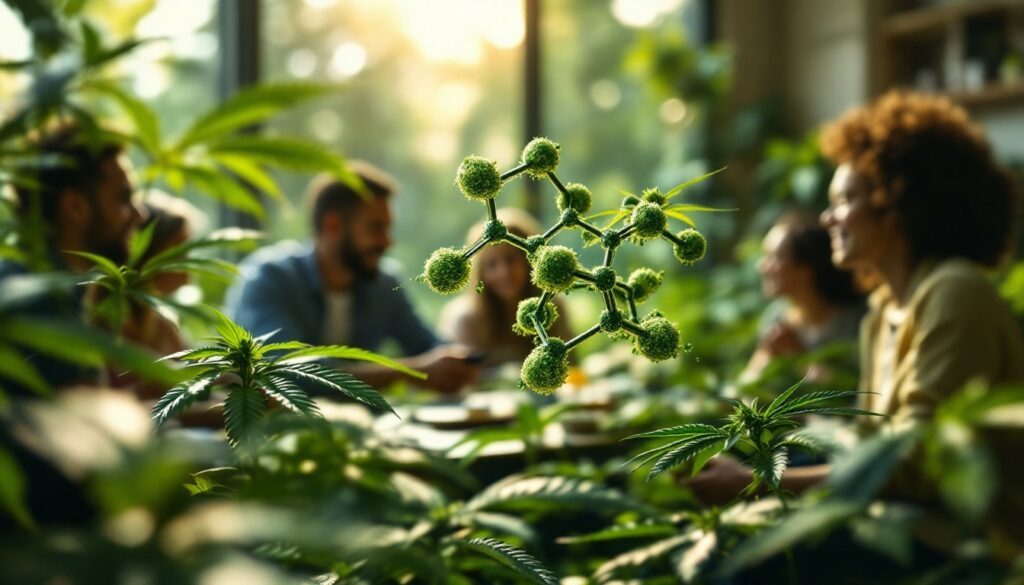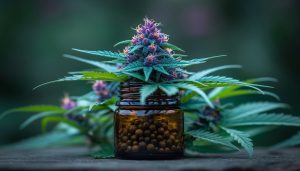In the complex world of cannabis, THC stands out as the most famous and controversial active molecule. Often associated with its psychotropic effects, tetrahydrocannabinol is generating growing interest among both researchers and consumers. Let’s discover the many facets of this intriguing cannabinoid. What is THC?THC, or tetrahydrocannabinol, is one of the many cannabinoids found in the cannabis plant. This chemical compound is primarily responsible for the psychoactive effects often associated with cannabis. Its ability to alter perception, induce a euphoric state, and influence behavior has made it a central molecule in discussions about cannabis. In 1964, a team of researchers led by Raphael Mechoulam successfully isolated and identified THC, paving the way for a new scientific understanding of cannabis. Since then, THC has been extensively studied for its various effects on the human brain and body, as well as its therapeutic potential. How does THC affect the human body? To understand how THC produces its effects, we must explore the endocannabinoid system, a complex network of receptors scattered throughout the human body. These receptors interact with both natural and plant-derived cannabinoids like THC. The two main types of receptors are CB1, primarily located in the brain and central nervous system, and CB2, more prevalent in the immune system. When consumed, THC binds primarily to CB1 receptors, producing euphoric effects and temporarily altering chemical communication in the brain. This can lead to mood swings, altered perception of time, increased appetite, and sometimes even visual or auditory hallucinations. The Psychotropic Effects of THC: A Blessing or a Curse? The psychotropic effects of THC have placed it at the center of much debate. For some users, these effects provide a pleasant feeling of relaxation and euphoria, improving their overall well-being. However, for others, they can cause anxiety or paranoia, making the experience less pleasant.
Sommaire
ToggleOn the other hand, these properties have sparked growing interest in the medical use of THC. Research suggests that this cannabinoid may reduce chronic pain, relieve nausea, and stimulate appetite in patients with serious illnesses such as cancer or AIDS. However, its therapeutic use remains strictly regulated and often requires controlled dosages to minimize unwanted side effects.
The Difference Between THC and CBD Although often confused, THC and CBD represent two almost opposite worlds in the cannabis universe. Cannabidiol (CBD), another major cannabinoid, does not cause psychotropic effects and is generally valued for its relaxing and anti-inflammatory properties without altering the mind.The interaction between these two compounds is crucial, as CBD can modulate some of the potential negative effects of THC, such as anxiety. This complementarity explains why many products combine the two molecules to provide a balanced experience. Combined Uses of THC and CBD: Finding the Perfect Balance Cannabis products containing both THC and CBD are sought after for their mutual potentiation. Indeed, by adjusting the ratios of these two cannabinoids, the desired effects can be customized, optimizing benefits while minimizing risks. High-THC Products: Ideal for those seeking pronounced psychoactive effects.Balanced THC/CBD Blends: Designed to provide a smooth and harmonious experience. CBD-dominant products:
Intended for those seeking therapeutic effects without the high. This flexibility makes the THC-CBD combination appealing to a variety of consumers, seeking either medical relief or simply a moment of relaxation tailored to their individual needs.THC and legislation: a constantly evolving landscape Legislation surrounding THC varies enormously around the world. In some regions, high-THC cannabis is completely illegal, while others allow it for recreational and medical purposes. For example, in Canada, full legalization allows for widespread accessibility in various forms. In Europe, the situation is more complicated. Some countries are gradually relaxing their regulations, particularly for therapeutic use, but regulatory uncertainty persists. It is essential for consumers to familiarize themselves with the laws of their jurisdiction to avoid legal complications. The Impact of Regulation on the THC Market
The complexity of regulations directly affects the development and innovation surrounding THC. Where the legal environment is favorable, companies like Weedy.fr can thrive and develop innovative products tailored to diverse clienteles.
Conversely, in regions where regulations are restrictive, opportunities are limited, hindering users’ access to well-formulated options. This also highlights the importance of international legal harmonization to facilitate scientific research and cross-border trade. Overconsumption and Consequences: The Other Side of the THC Coin As with any active substance, abuse or overconsumption of THC can lead to adverse effects. It is essential to know and respect your limits to avoid unpleasant experiences or long-term impacts on mental health. Symptoms of overuse include confusion, panic, paranoia, and sometimes even breathing difficulties if THC is inhaled through smoking or vaporization. A lack of moderation can also lead to addiction, although this is controversial among addiction experts. Adopt Responsible UseFor those interested in THC-based products, a responsible approach is essential. Here are some tips for safe use:
Start with low doses to assess your individual tolerance. Choose labeled products that guarantee quality and safety. Avoid mixing substances, especially with alcohol or other drugs. Stay informed about the potential effects on your physical and mental health. This cautious approach helps ensure that the experience remains constructive and satisfying. FAQs about THC and Cannabis
What are the main effects of THC?
THC primarily causes euphoric and psychoactive effects. It can increase appetite, alter sensory perception, and induce muscle relaxation. However, its effects vary among individuals and may include anxiety or feelings of paranoia. What is the main difference between THC and CBD? THC and CBD are two distinct cannabinoids derived from cannabis. THC is psychoactive, meaning it alters the state of mind and can cause euphoric feelings. In contrast, CBD does not induce psychotropic effects and is known for its relaxing and therapeutic properties. Is it legal to consume THC? The Legality of THC
The legal status of THC varies from country to country. In some states, it is completely prohibited, while others allow it for medical or recreational use. Before consuming THC, it is crucial to research local laws to avoid any violations. How can THC be used for medical purposes?THC has several potential medical applications. It is used to relieve chronic pain, alleviate nausea symptoms associated with chemotherapy, and improve appetite in people suffering from conditions such as cancer or HIV/AIDS. However, its use often requires a prescription and must be supervised by a healthcare professional.
Alexandre Lacarré is recognized as an innovative and influential leader in the cannabidiol (CBD) industry. Alexandre began his career in the biotechnology sector, where he gained valuable expertise in research and development. Passionate about the therapeutic potential of natural compounds, he quickly shifted his focus to the nascent CBD industry.



